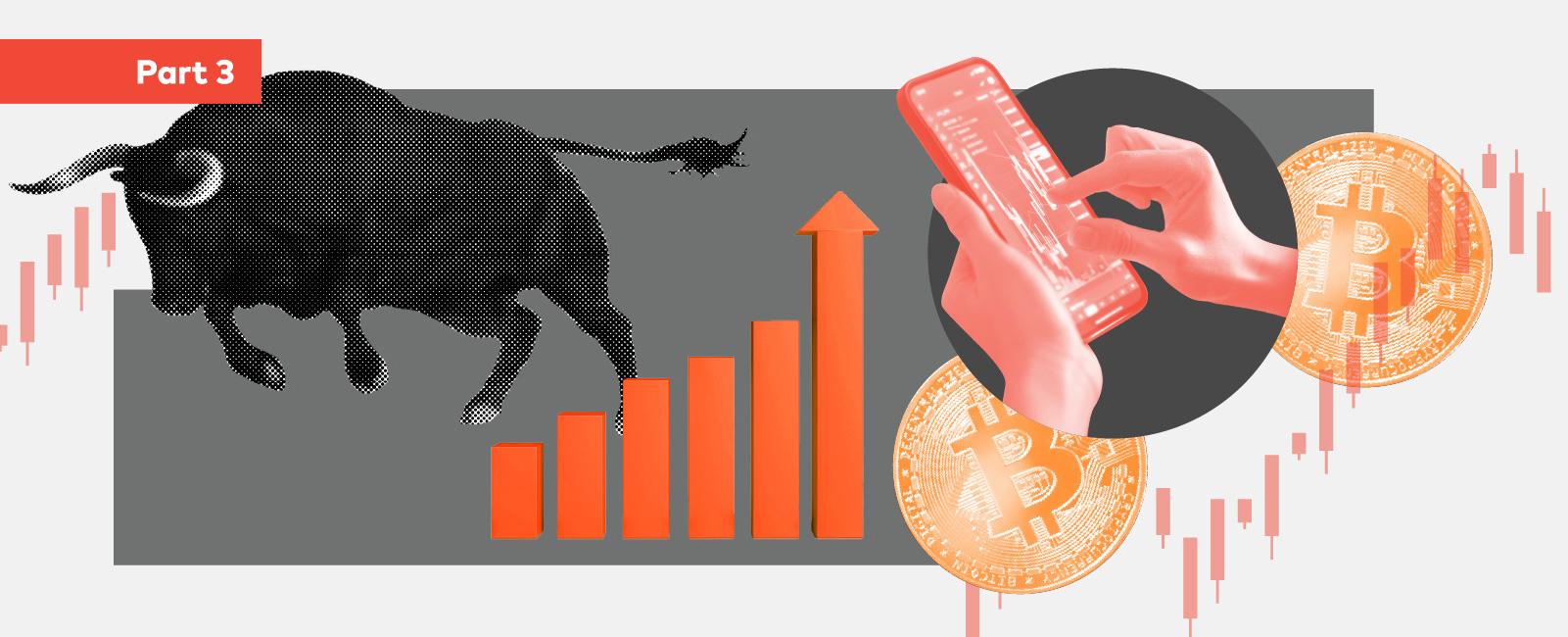Part 1 of our series on the history of cryptocurrency regulation in America looked at the burgeoning years of cryptocurrency – mainly Bitcoin – and the attempt to regulate it through criminal enforcement actions, while Part 2 examined the birth of the Ethereum network, the 2017 Bull Run, and the long crypto winter that followed it.
Part 3 explores the 2021 Bull Run, which culminated in Bitcoin reaching an all-time high price of approximately $68,000. During this period, Tesla will put Bitcoin on its balance sheet, the SEC will file suit against one of the world’s top cryptocurrencies, and the CFTC will continue to classify Ethereum as a commodity. Crypto Mom will be joined by others in her calls for more regulatory clarity.
The start of the 2021 Bull Run
Starting in October 2020, Bitcoin and Ether will begin a strong and steady climb in price. This bull run will top out around March 2021, crash, and bottom out by July 2021, and then retake a new all-time high by November 2021. A pivotal moment of this period is the SEC filing of a lawsuit against Ripple, a legal battle that will last into 2023. This period also has calls for clarification of regulation by SEC Commissioner Peirce and culminates in the appointment of a new SEC Chairman. The CFTC is largely quiet, only reiterating that Bitcoin and Ether are commodities.
October 10, 2020: SEC Commissioner Hester Peirce explains during the LA Blockchain Summit that Ethereum-based decentralized finance tokens could be treated as securities-like financial instruments. She also repeats the need for her “safe harbor” approach, first mentioned in August 2019, which would allow cryptocurrency companies a timeline to come into compliance. She notes, however, that she is working on a safe harbor proposal 2.0 because her first proposal had not yet received the support it needed at the SEC.
October 27, 2020: Hinman announces his resignation. Hinman was the first SEC official to ever say Ether is not a security.
December 2020: The CFTC releases its “Digital Asset Primer,” and again references Bitcoin as a commodity. However, this time it also introduces the idea of “digital assets” versus “virtual currencies.”
December 22, 2020: The SEC announces it was filing an action against Ripple Labs, Inc. (Ripple), and two of its executives, alleging they raised $1.3 billion through an unregistered, ongoing digital asset securities offering. Ripple was responsible for creating XRP, the world’s third largest cryptocurrency at the time the SEC announced the lawsuit. The SEC alleges that XRP is a security and that Ripple failed to provide investors with the proper information they needed to assess potential risks.
December 23, 2020: The next day, SEC Chairman Clayton resigns, likely in anticipation of the incoming administration of President Joe Biden.
January 1, 2021: Bitcoin is $29,300. Ether is $775.
January 8, 2021: SEC Commissioner Peirce says enforcement is never a good way to provide clarity, citing the SEC’s lawsuit against Ripple.
January 21, 2021: CFTC Chairman Tarbert resigns as the administration of President Donald Trump comes to a close. President Joe Biden names Rostin Benham as Acting Chairman of the CFTC.
January 26, 2021: SEC Commissioner Peirce states, “The U.S. government needs to provide more clarity and guideposts for crypto regulations – and better cross-agency coordination is needed.” She also comments on changes at the SEC, noting, “I’m hopeful that we’ll see some changes at the SEC in terms of predictions on what will happen. I’ll just say, generally, that I think that we will make some strides. But again, that’s probably informed by my optimism. But I hope that we’ll make some progress there.” She encouraged the industry to “continue to think about how the technology can be used in developing your projects.”
February 8, 2021: Tesla announces in an SEC filing that it has purchased $1.5 billion worth of Bitcoin.
About a week later, Bitcoin hits $56,000 and Ether hits $1,800.
March 4, 2021: SEC Commissioner Peirce states, “The agency is old and has not historically been great with innovation. When a regulator is presented with something new, our safest response is to say, ‘Sorry, why don’t you stick with the old traditional stuff? Because we know how to regulate that.’”
March 12, 2021: Bitcoin tops out at $61,200. Ether is $1,900.
April 8, 2021: FTX CEO Sam Bankman-Fried announces that the Miami Heat stadium will be renamed FTX stadium in a $135 million naming rights deal.
April 13, 2021: SEC Commissioner Peirce releases Token Safe Harbor Proposal 2.0. The new updates require companies to provide updates to the SEC every six months, as well as hire outside counsel to explain whether the network could be considered “decentralized” at the end of the grace period.
April 19, 2021: Gary Gensler is sworn in as Chairman of the SEC. Chairman Gensler previously served as the Chairman of the CFTC under President Back Obama from December 18, 2008 until January 3, 2014.
Despite calls for more clarity by SEC Commissioner Peirce, Bitcoin and Ether reached new highs. In the coming months, there will be a cooldown in price and a new SEC Chairman will enter the picture. The appointment and swearing in of SEC Chairman Gensler will mark the reversal of the SEC’s position that Ether is a commodity, and begin to pit the CFTC against the SEC.
A temporary cooldown – May 2021 to July 2021, and the final climb
May 7, 2021: Ether spikes to $3,900. Bitcoin drops slightly to $58,925.
June 9, 2021: SEC Commissioner Peirce states that stricter crypto laws will stifle innovation.
June 25, 2021: Ether is now $1,800. Bitcoin is $32,275.
July 14, 2021: SEC Commissioners Peirce and Elad. R. Roisman issue a joint public statement noting significant regulatory uncertainty. They write:
“[t]he only certainty we see is that people have questions about how to comply with the applicable laws and regulations.” . . . “There is a decided lack of clarity for market participants around the application of the securities laws to digital assets and their trading.” . . . “[W]ith respect to many digital assets, the application of the Howey test is not crystal clear.” . . . “[P]roviding clear regulatory guideposts and then bringing enforcement actions against people who ignore them is a better approach than the clue-by-enforcement approach that we have embraced to date.”
July 16, 2021: Bitcoin bottoms at $31,500. Ether bottoms at $1,900.
August 2021: CFTC Commissioner Quintenz states that there is currently a futures contract on Ether, therefore it is “under the CFTC’s purview, which makes ETH a non-security commodity.”
August 31, 2021: CFTC Commissioner Quintenz resigns.
September 3, 2021: Ether is $3,887. Bitcoin is $49,960.
October 5, 2021: U.S. Representative Patrick McHenry introduces the Clarity for Digital Tokens Act of 2021, which would effectively codify SEC Commissioner Peirce’s Token Safe Harbor Proposal 2.0.
October 15, 2021: In an enforcement action footnote, the CFTC writes: “Bitcoin, ether, litecoin, and tether tokens, along with other digital assets, are encompassed within the broad definition of commodity.” In support of this position, the CFTC relies on a 2018 federal court case out of the Eastern District of New York. In that case, the court held “Virtual currencies can be regulated by the CFTC as a commodity.”
October 21, 2021: SEC Commissioner Peirce delivers a harsh assessment in an interview, noting:
It is disconcerting to me that for three years now I’ve been asking for regulatory clarity, and we can’t seem to provide any. I think this is really becoming a huge barrier to this industry being able to develop in a way that’s safe, but also in a way that allows innovation to happen. And it’s a real shame to me that we are not just taking up the mantle as regulators to develop a regulatory framework.
November 9, 2021: Bitcoin tops out at $67,500. This is the highest price Bitcoin has ever hit to date. Ether is $4,644, which is also the highest price it has ever hit to date.
Next: Disagreements over Ether and the 2022 crypto collapse
The rapid rise in Bitcoin’s price spurs regulators to call for more clarity. The SEC’s new chairman will begin to view Ether differently than his CFTC counterparts. These disagreements will become more pronounced as the crypto collapse begins following Bitcoin reaching its new all-time high.
Stay tuned to Ascend Magazine for the conclusion of our timeline of cryptocurrency regulation in America.
Sean Gellis is the founder of Gellis Law, PLLC, a Florida-based legal and consulting firm focused on GovTech and regulation. Prior to opening his firm, Sean spent nine years in public service, including as the chief of staff for the business arm of Florida government and general counsel of the nation’s third largest state transportation department.
MORE VOICES ARTICLES

Trust on trial: Navigating the murky waters of scientific integrity
As fraudulent research papers flood academic journals, the sanctity of scientific discovery is under siege, challenging the very foundation of trust we place in peer-reviewed publications. With AI now both a tool for creating and detecting such deceptions, the urgency for a robust, independent regulatory framework in scientific publishing has never been greater.

Do regulators deserve deference?
In a pivotal moment for regulatory law, the U.S. Supreme Court’s review of the Chevron doctrine could redefine the bounds of deference courts give to regulatory agencies, potentially inviting more challenges to their authority. This critical examination strikes at the heart of longstanding legal principles, signaling a significant shift in the landscape of regulatory oversight and its interpretation by the judiciary.

From Frankenstein to Siri: Accountability in the era of automation
As AI advances in sectors from health care to engineering, who will be held accountable if it causes harm? And as human decision-makers are replaced by algorithms in more situations, what will happen to uniquely human variables like empathy and compassion? Harry Cayton explores these questions in his latest article.

Regulating joy: The risky business of festivities
In his final Voices article of 2023, Harry Cayton reflects on our enthusiasm for participating in cultural festivities that often cause injuries or even deaths, which has led some governments to attempt to regulate these risky celebrations.

Building my regulator of tomorrow with LEGO® bricks
What should the regulator of tomorrow look like? While there may be no definitive vision, contributor Rick Borges gets creative with answering this important question, drawing inspiration from a favorite toy to ‘build’ a model of an effective future regulator.

‘Thin’ and ‘thick’ rules of regulation: Cayton reviews Daston’s history of what we live by
Lorraine Daston explores fascinating examples of rulemaking throughout history in her new book, ‘Rules: A Short History of What We Live By.’ In this article, Harry Cayton discusses what regulators can learn from Daston’s work.








